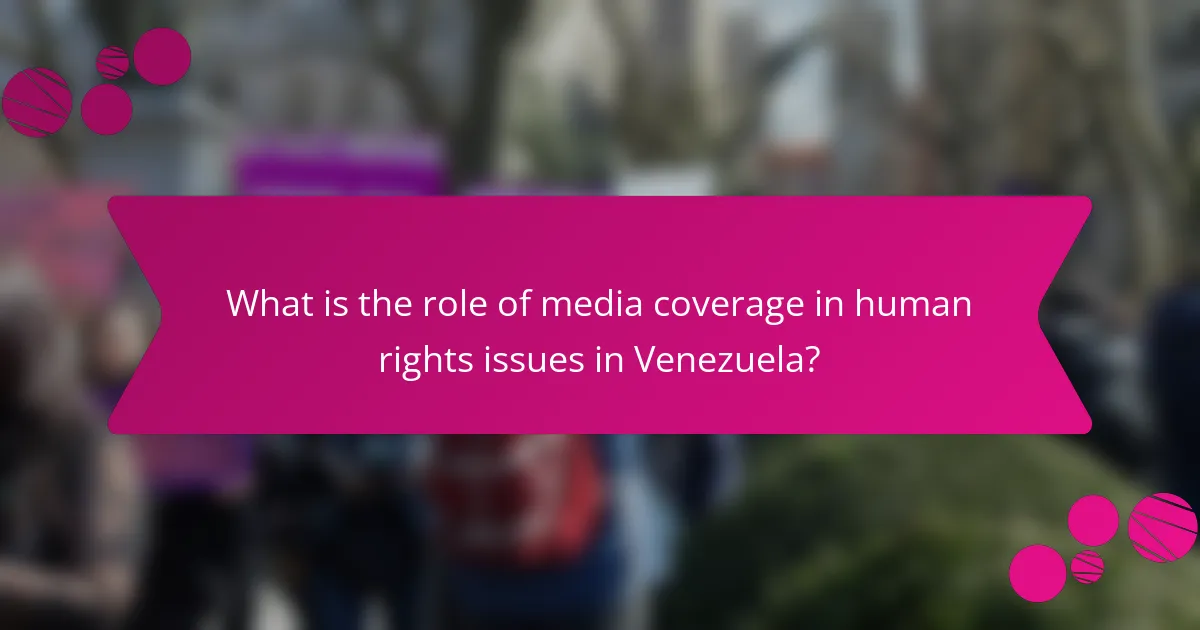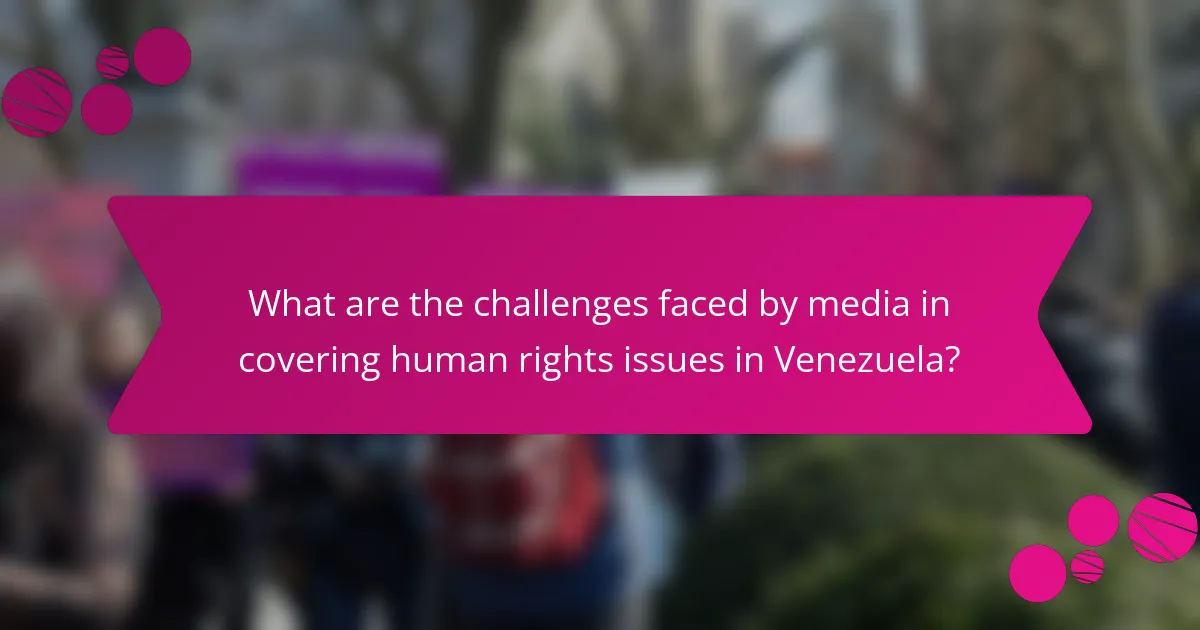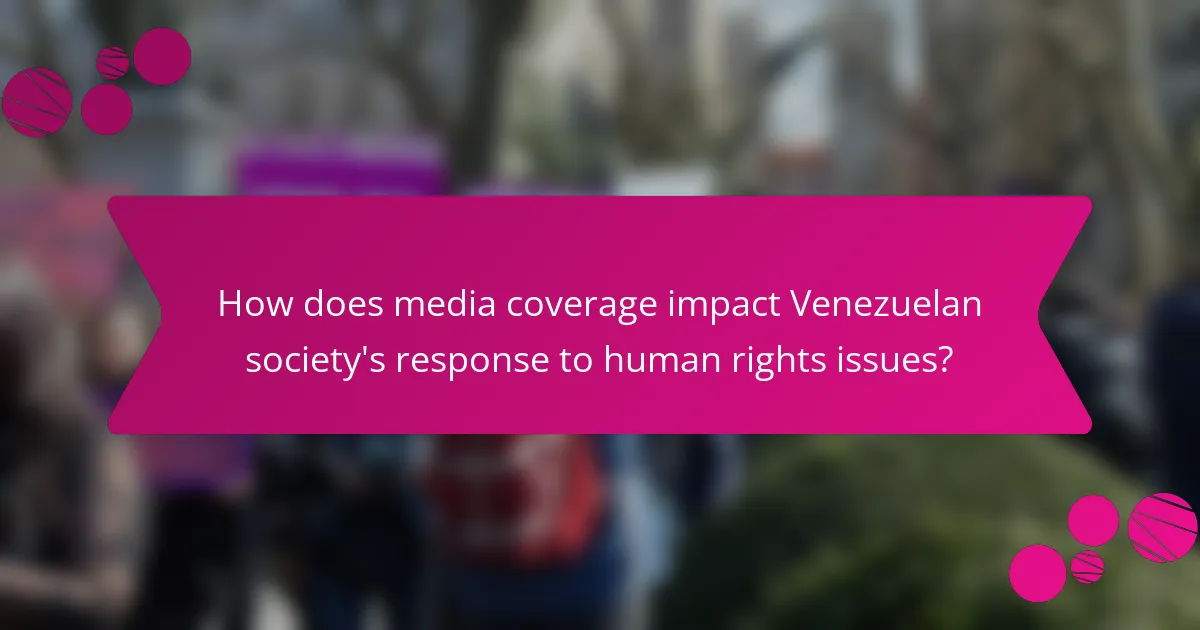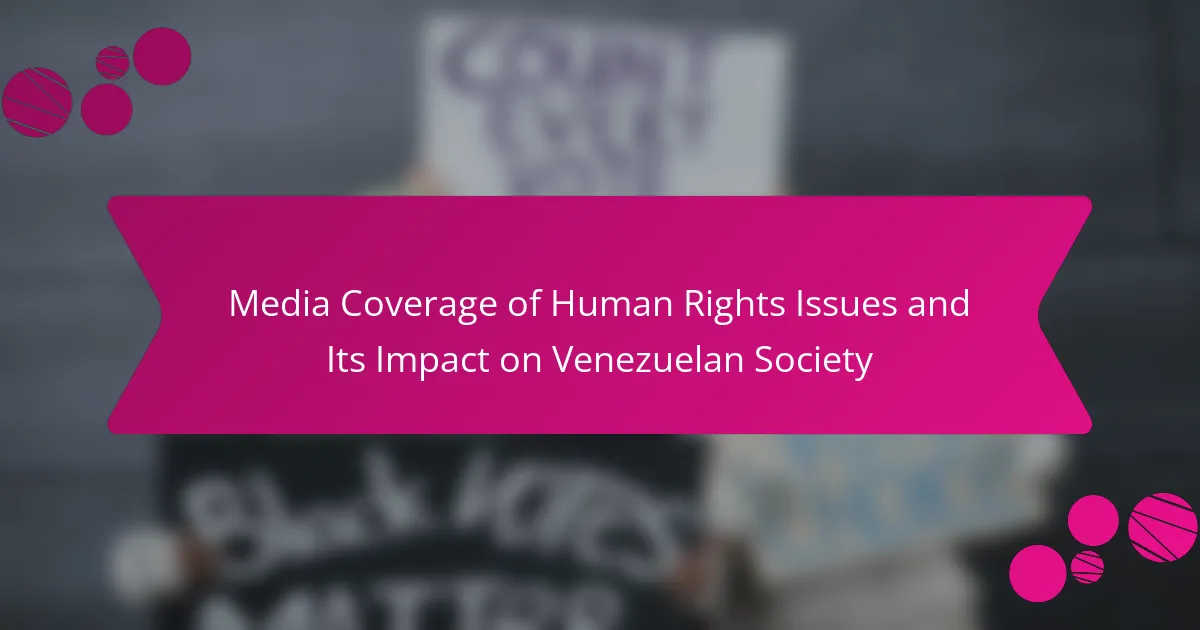
What is the role of media coverage in human rights issues in Venezuela?
Media coverage plays a crucial role in highlighting human rights issues in Venezuela. It raises awareness about violations occurring within the country. Reports from international media expose abuses by the government and security forces. Coverage can mobilize public opinion both domestically and internationally. This pressure can lead to calls for accountability and reform. For instance, organizations like Human Rights Watch and Amnesty International rely on media reports to document abuses. Media coverage also provides a platform for victims to share their stories. This visibility can foster advocacy and support for human rights initiatives. Overall, media coverage is essential for promoting transparency and justice in Venezuela.
How does media coverage influence public perception of human rights in Venezuela?
Media coverage significantly influences public perception of human rights in Venezuela. The portrayal of human rights violations in news reports shapes how both domestic and international audiences view the situation. For instance, frequent coverage of protests and government crackdowns can lead to increased awareness and concern among the public. According to a 2021 study by Human Rights Watch, media reports have highlighted abuses, prompting international condemnation and calls for action. Social media also amplifies these narratives, allowing for rapid dissemination of information. In contrast, limited or biased coverage can create apathy or misinformation regarding human rights issues. Thus, the type and frequency of media coverage directly affect public understanding and engagement with human rights in Venezuela.
What are the key human rights issues reported in the Venezuelan media?
Key human rights issues reported in the Venezuelan media include arbitrary detentions, torture, and extrajudicial killings. The media highlights cases of political prisoners facing inhumane conditions. Reports also focus on the repression of freedom of expression and assembly. Violations against journalists and activists are frequently documented. The humanitarian crisis exacerbates these issues, with reports on inadequate access to healthcare and food. International organizations corroborate these findings, emphasizing the systemic nature of human rights abuses in Venezuela.
How does the portrayal of these issues vary across different media outlets?
Portrayal of human rights issues varies significantly across different media outlets. Some outlets emphasize governmental failures while others highlight grassroots movements. For instance, international media often focus on systemic abuses, citing reports from organizations like Human Rights Watch. In contrast, local media may downplay these issues due to government pressure or censorship. Furthermore, the framing of narratives differs; some outlets present human rights violations as urgent crises, while others may treat them as background events. This disparity can shape public perception and influence advocacy efforts. Research indicates that biased reporting can affect audience understanding, leading to polarized views on the situation in Venezuela.
Why is media coverage important for human rights advocacy in Venezuela?
Media coverage is crucial for human rights advocacy in Venezuela because it raises awareness about violations. Increased visibility can mobilize international support and pressure the government. Reports from credible media outlets can document abuses, providing evidence for advocacy groups. This documentation is vital for holding perpetrators accountable. Furthermore, media coverage can inform the public, fostering a culture of human rights. It also encourages dialogue and engagement among civil society. In a country with restricted access to information, media serves as a lifeline for truth. Ultimately, it empowers local advocates by amplifying their voices on a global stage.
How does media coverage affect the actions of human rights organizations?
Media coverage significantly influences the actions of human rights organizations. It raises awareness about human rights violations. Increased visibility can lead to public outcry and pressure on governments. Human rights organizations often use media coverage to mobilize support. For instance, reports on abuses can prompt organizations to launch campaigns. These campaigns may include protests, petitions, or lobbying efforts. Research shows that media attention correlates with increased funding for these organizations. A study by the Pew Research Center found that media coverage can enhance public engagement in human rights issues. Thus, effective media coverage can drive organizational strategies and responses to human rights crises.
What impact does media attention have on government accountability?
Media attention significantly enhances government accountability. It serves as a watchdog, exposing corruption and mismanagement. When the media reports on government actions, it prompts public scrutiny. This scrutiny can pressure officials to act transparently. Historical examples show that investigative journalism has led to policy changes. For instance, coverage of political scandals often results in resignations. In Venezuela, media attention on human rights violations has mobilized international response. Consequently, increased visibility can deter government misconduct. Overall, media acts as a critical check on governmental power.

What are the challenges faced by media in covering human rights issues in Venezuela?
Media in Venezuela faces severe challenges in covering human rights issues. Government censorship restricts access to information. Journalists often face intimidation and threats. The political climate creates a hostile environment for reporting. Limited resources hinder investigative journalism efforts. Access to reliable sources is frequently obstructed. Legal repercussions for dissenting voices increase self-censorship. These factors collectively impair the media’s ability to report accurately on human rights violations.
How do censorship and government control affect media reporting?
Censorship and government control significantly limit media reporting by restricting access to information. In Venezuela, the government has implemented strict laws that hinder journalistic freedom. These laws often lead to self-censorship among reporters who fear repercussions. Consequently, critical issues, such as human rights violations, receive inadequate coverage. Reports indicate that over 90% of independent media outlets have faced harassment or closure. This suppression creates a distorted public perception of reality. Without diverse viewpoints, citizens remain uninformed about crucial societal issues. The result is a weakened democratic process and diminished accountability for government actions.
What specific laws or regulations limit media freedom in Venezuela?
The specific laws that limit media freedom in Venezuela include the Law on Social Responsibility in Radio, Television, and Electronic Media. This law imposes strict regulations on content, including penalties for broadcasting material deemed inappropriate by the government. It restricts the dissemination of information that could incite public unrest or discredit the government. Additionally, the Law Against Hate, for Peace and Tolerance criminalizes speech that is perceived as promoting hatred or intolerance, further constraining journalistic freedom. The government also employs censorship tactics, including shutting down media outlets and blocking websites. These laws create a hostile environment for journalists, limiting their ability to report freely on human rights issues.
How do journalists navigate risks when reporting on human rights violations?
Journalists navigate risks when reporting on human rights violations through careful planning and adherence to safety protocols. They conduct thorough risk assessments to identify potential dangers in their reporting environment. Journalists often collaborate with local organizations to gain insights and support. They utilize secure communication tools to protect sensitive information. Training in conflict reporting helps them prepare for challenging situations. Many journalists establish safety networks for emergency assistance. They also prioritize anonymity for sources to mitigate risks. This approach is essential in high-risk regions, such as Venezuela, where human rights violations are prevalent.
What role do social media platforms play in human rights reporting?
Social media platforms serve as crucial tools for human rights reporting. They enable rapid dissemination of information regarding human rights violations. Users can share real-time updates and eyewitness accounts. This immediacy helps raise awareness globally. Social media also facilitates grassroots activism and mobilization. Organizations can engage directly with communities and amplify marginalized voices. Studies show that social media has increased visibility for human rights issues. For instance, the #MeToo movement gained momentum through platforms like Twitter and Facebook. These platforms have transformed how information is shared and consumed in the context of human rights.
How do social media amplify the voices of human rights activists in Venezuela?
Social media amplify the voices of human rights activists in Venezuela by providing a platform for widespread communication. Activists can share real-time updates about human rights violations. This immediate access to information helps raise awareness both locally and globally. Social media allows for the mobilization of support through campaigns and hashtags. For instance, the hashtag #SOSVenezuela gained international attention, highlighting the country’s crisis. Additionally, platforms like Twitter and Facebook facilitate direct engagement with followers and supporters. This interaction can lead to increased pressure on authorities to address human rights issues. The ability to bypass traditional media barriers enhances the reach of activists’ messages. Consequently, social media play a crucial role in advocating for human rights in Venezuela.
What are the risks associated with using social media for human rights advocacy?
Using social media for human rights advocacy poses several risks. These include censorship by governments that may restrict access to information. Activists can face harassment or threats from opposing groups or authorities. Misinformation can spread rapidly, undermining credible advocacy efforts. Data privacy concerns arise as personal information may be exposed. Social media platforms can also be manipulated to discredit activists. In countries like Venezuela, these risks are heightened due to political repression. The potential for surveillance increases the danger for those advocating for human rights online.

How does media coverage impact Venezuelan society’s response to human rights issues?
Media coverage significantly influences Venezuelan society’s response to human rights issues. It shapes public awareness and understanding of these issues. Increased media attention often leads to heightened public outrage and demands for accountability. For instance, reports on human rights violations can mobilize protests and advocacy efforts. Conversely, limited or biased coverage can downplay the severity of these issues. This can result in apathy or resignation among the populace. Studies indicate that when media outlets prioritize human rights stories, societal engagement increases. In contrast, censorship or self-censorship often leads to a lack of informed citizenry. Overall, the media’s role is crucial in framing the narrative around human rights in Venezuela.
What changes in public awareness have resulted from media coverage of human rights issues?
Media coverage of human rights issues has significantly increased public awareness. This awareness has led to greater understanding of human rights violations in Venezuela. Reports have highlighted abuses by the government, prompting public outcry. Increased visibility has encouraged activism among citizens. Social media has amplified these messages, reaching wider audiences. Surveys indicate that more people are informed about human rights issues now than in previous years. Consequently, there has been a rise in grassroots movements advocating for change. Overall, media coverage has transformed public perception and engagement with human rights in Venezuela.
How does increased awareness influence social movements in Venezuela?
Increased awareness significantly influences social movements in Venezuela by mobilizing public support and fostering collective action. As citizens become more informed about human rights violations, they are more likely to participate in protests and advocacy. This heightened awareness is often driven by media coverage, which highlights injustices and amplifies marginalized voices. For instance, reports on government repression have led to widespread demonstrations against authoritarian practices. Social media platforms also play a crucial role in disseminating information rapidly, allowing movements to gain traction. Moreover, increased awareness can attract international attention and support, pressuring the Venezuelan government to address human rights concerns. Ultimately, the cycle of awareness and action strengthens social movements and encourages sustained activism in Venezuela.
What role does media play in shaping public discourse around human rights?
Media plays a crucial role in shaping public discourse around human rights. It serves as a primary channel for disseminating information about human rights issues. Through news articles, documentaries, and social media, media highlights violations and advocates for accountability. This visibility influences public awareness and opinion regarding human rights practices. For instance, coverage of protests or abuses can mobilize communities and foster activism. Studies show that increased media attention correlates with heightened public concern and policy responses. In Venezuela, media coverage has been pivotal in exposing human rights abuses, prompting international scrutiny and advocacy. Thus, media is instrumental in framing the narrative around human rights and driving societal change.
What are the implications of media coverage for future human rights advocacy in Venezuela?
Media coverage significantly influences future human rights advocacy in Venezuela. It raises awareness of human rights violations and mobilizes international support. Increased visibility can pressure the Venezuelan government to improve its human rights record. Moreover, accurate reporting helps build credibility for human rights organizations. Media coverage also fosters solidarity among activists and encourages grassroots movements. In contrast, biased or incomplete reporting can hinder advocacy efforts. Overall, the implications of media coverage are crucial for shaping the landscape of human rights in Venezuela.
How can improved media practices enhance human rights reporting?
Improved media practices can enhance human rights reporting by increasing accuracy and accessibility. Accurate reporting ensures that human rights violations are documented correctly. This prevents misinformation and helps build trust with the audience. Accessibility allows a wider audience to engage with human rights issues. It can involve using simple language and diverse platforms to reach different demographics.
Furthermore, enhanced training for journalists on human rights issues can lead to more informed reporting. Journalists equipped with proper knowledge are better able to cover complex issues. Incorporating technology, such as social media and mobile reporting, can also broaden the reach of human rights stories. This allows for real-time updates and engagement with the public.
A study by the International Federation of Journalists highlights that improved media practices lead to better public awareness of human rights issues. Increased public awareness can drive advocacy and policy changes. Ultimately, these practices contribute to a more informed society that can hold power accountable.
What strategies can activists use to leverage media coverage effectively?
Activists can leverage media coverage effectively by developing strong narratives. A compelling story captures attention and engages audiences. They should also utilize social media platforms to amplify their messages. This approach allows for direct communication with the public and media.
Building relationships with journalists is crucial. Activists should provide them with accurate information and timely updates. Hosting press events can create opportunities for media engagement. These events can showcase the importance of their cause.
Using visuals, such as photos and videos, enhances media appeal. Visual content often attracts more coverage than text alone. Activists should also monitor media coverage to gauge effectiveness. This helps them adjust strategies based on public response.
Collaborating with other organizations can expand reach. Partnerships create a unified front that draws more attention. By employing these strategies, activists can maximize their impact through media coverage.
What best practices can be adopted for effective media coverage of human rights issues?
Effective media coverage of human rights issues requires accuracy, sensitivity, and context. Journalists should verify facts before publication to ensure truthfulness. They must also use language that respects the dignity of individuals involved. Contextualizing human rights issues within local and global frameworks enhances understanding. Engaging with affected communities provides authentic perspectives and voices. Collaborating with human rights organizations can offer valuable insights and resources. Transparency about sources and methodologies builds trust with audiences. Lastly, ongoing training in human rights reporting can improve journalistic standards and practices.
How can journalists ensure accuracy and integrity in reporting human rights issues?
Journalists can ensure accuracy and integrity in reporting human rights issues by adhering to rigorous fact-checking protocols. They should verify information from multiple credible sources. This practice helps to confirm the authenticity of claims made regarding human rights violations. Journalists must also provide context to the issues being reported. Contextualization aids in understanding the complexities of human rights situations.
Additionally, journalists should engage with affected communities. This engagement allows for firsthand accounts and perspectives that enhance the depth of reporting. Transparency in sourcing is crucial. Journalists should disclose their sources when possible to build trust with their audience.
Ethical guidelines established by organizations like the Society of Professional Journalists promote accountability. Following these guidelines reinforces the commitment to accurate reporting. Finally, continuous education on human rights issues is essential. This education equips journalists with the knowledge to report sensitively and accurately.
What collaborative efforts can enhance media coverage of human rights in Venezuela?
Collaborative efforts that can enhance media coverage of human rights in Venezuela include partnerships between local and international media organizations. These collaborations can provide resources and expertise that local journalists may lack. Training programs for Venezuelan journalists can improve reporting skills and ethical standards. Furthermore, cross-border information sharing can facilitate the dissemination of human rights stories. Engaging with human rights organizations can help journalists access accurate data and testimonies. Additionally, utilizing social media platforms can amplify coverage and reach a broader audience. Documenting and reporting on specific human rights abuses can raise international awareness. These combined efforts can create a more informed public and drive advocacy for change.
The main entity of this article is media coverage of human rights issues in Venezuela. The article examines the role of media in raising awareness about human rights violations, shaping public perception, and influencing advocacy efforts within the country. It highlights key issues reported, such as arbitrary detentions and torture, and discusses the challenges faced by journalists, including government censorship and intimidation. Additionally, the article explores how social media amplifies activist voices and the impact of media attention on government accountability and public engagement with human rights issues in Venezuela. Overall, it underscores the critical importance of accurate and effective media coverage in promoting human rights advocacy and societal change.
